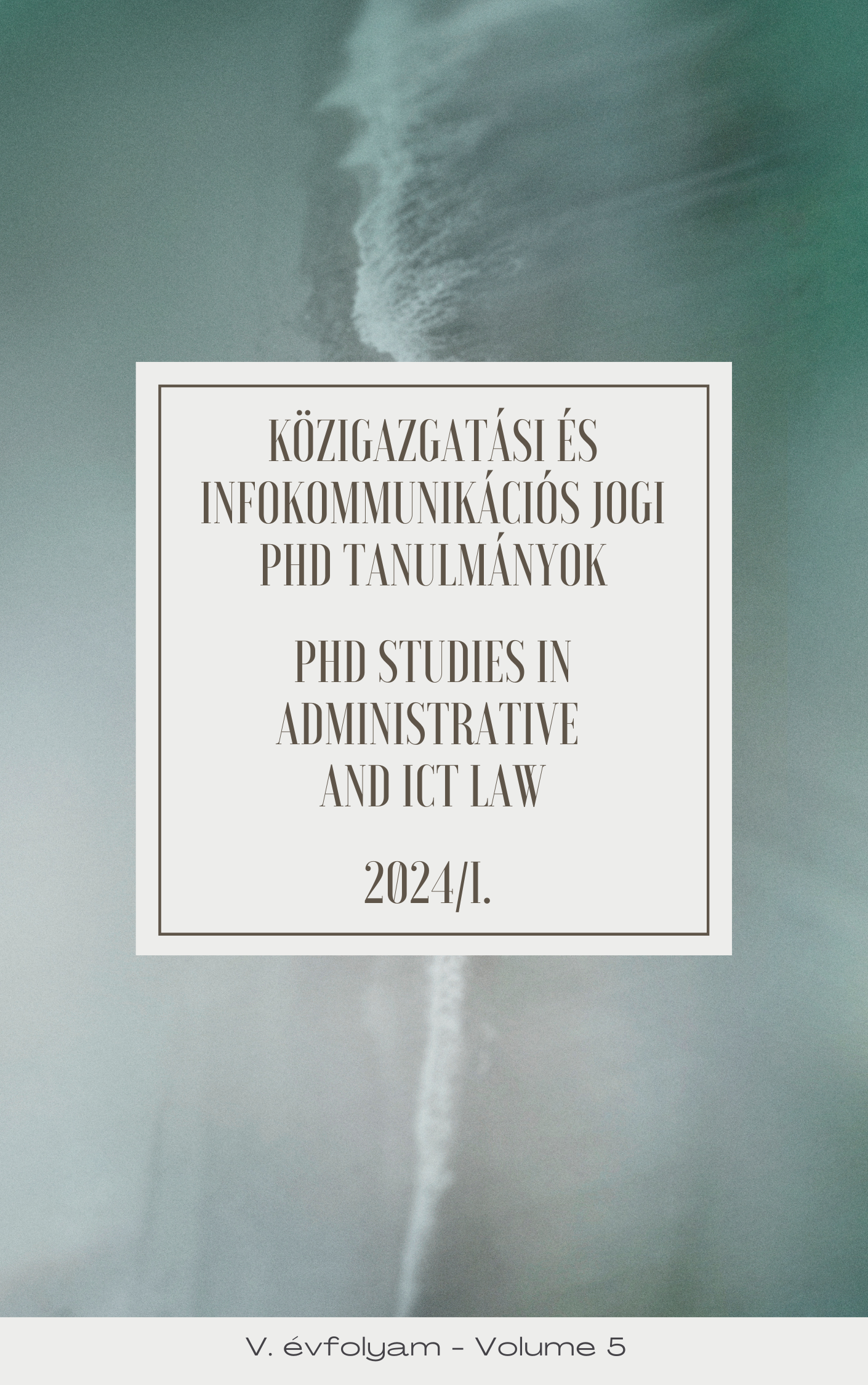Possible definitions of the concept of data usage
DOI:
https://doi.org/10.47272/KIKPhD.2024.1.2Keywords:
Data, Data usage, DIKW pyramidAbstract
The use of data is becoming increasingly important, both from a technological and legal research perspective. This paper aims to examine the first element of the conceptual pair of data utilisation, in order to address the current patchy and often misunderstood state of affairs. To this end, the existing literature and practice will be used to shed light on the concept of data from several perspectives, in particular to facilitate future research on its use.
Downloads
References
Adanma Cecilia Eberendu: Unstructured Data: an overview of the data of Big Data. International Journal of Emerging Trends & Technology in Computer Science 38(1), 46-50. https://doi.org/10.14445/22312803/IJCTT-V38P109
Alexandra Anghel, Elena Novacescu, Madalina Cuc: Big Data and Its Secrets: Types of Big Data. Romanian Intelligence Studies Review, 2022/27. 54-73 o.
Algorithm Watch: Automating Society Report 2020. https://automatingsociety.algorithmwatch.org/report2020/switzerland/switzerland-story/ (2024.04.30.)
Amy Affelt: Big Data, Big Opportunity. Australian Law Librarian, 21(2), 2013. 78-89. o.
Anya Bernstein: What Counts as Data?. Brooklyn Law Review, 86(2), 2021. 435-460. o.
Balogh Zsolt György: Jogi Informatika. Budapest-Pécs, Dialóg campus Kiadó, 1998. 17. o.
Charles I. Jones, Christopher Tonetti: Nonrivalry and the Economics of Data. American Economic Review 110(9), 2020. 2819–2858. o. https://doi.org/10.1257/aer.20191330
Chase Bibby, Jonathan Gordon, Gustavo Schuler, Eli Stein:The big reset: Data-driven marketing in the next normal”, McKinsey & Company, 2021. https://www.mckinsey.com/capabilities/growth-marketing-and-sales/our-insights/the-big-reset-data-driven-marketing-in-the-next-normal (2024.04.30.)
Christian Hänig, Martin Schierle, Daniel Trabold: Benefits of Unstructured Data for Industrial Quality Analysis. In: Sio-long Ao, Mahyar Amouzegar, Burghard Rieger (Eds.): Intelligent Automation and Systems Engineering. Lecture Notes in Electrical Engineering, vol 103. New York, Springer. https://doi.org/10.1007/978-1-4614-0373-9_20
Clare Southerton: Datafication. In: Laurie Schintler, Connie McNeely (Szerk.): Encyclopedia of Big Data. New York, Springer, 2020. 1-4 o. https://doi.org/10.1007/978-3-319-32001-4_332-1
Corwin D. Edward: The Meaning Of Quality. Quality Progress, 1(10), 1968. 36-39 o.
Darin K. Fox: What Is Web 2.0. AALL Spectrum 13(9), 2009. 2.o.
David Boddy, Albert Boonstra, Graham Kennedy: Managing Information Systems: Strategy and Organisation. London, Pearson Education, 2008.
Hohmann, Balázs: Interpretation the Concept of Transparency in the Strategic and Legislative Documents of Major Intergovernmental Organizations. Közigazgatási és Infokommunikációs Jogi PhD Tanulmányok 2(1), 2021, 48-56. o. https://doi.org/10.47272/KIKPhD.2021.1.4
IBM: What is strong AI?. https://www.ibm.com/topics/strong-ai (2024.04.30.)
Jennifer Rowley: The wisdom hierarchy: representations of the DIKW hierarchy. Journal of Information Science, 33(2), 163-180. o. https://doi.org/10.1177/0165551506070706
Jingran Wang, et. al.: Overview of Data Quality: Examining the Dimensions, Antecedents, and Impacts of Data Quality. Journal of the Knowledge Economy, 2023. https://doi.org/10.1007/s13132-022-01096-6
John D. Trimmer: The present situation in quantum mechanics: a translation of schrödinger's cat paradox paper. Proceedings of the American Philosophical Society, 124(5), 323-338. o.
Juan O. Freuler: Datafication, Identity, and the Reorganization of the Category Individual. Temple Law Review 95(4), 2023. 378 o.
Julia Carrie Wong: The Cambridge Analytica scandal changed the world – but it didn't change Facebook. The Guardian, 2019. https://www.theguardian.com/technology/2019/mar/17/the-cambridge-analytica-scandal-changed-the-world-but-it-didnt-change-facebook (2024.04.30.)
Jyoti Narayan, Krystal Hu, Martin Coulter, Supantha Mukherjee: Elon Musk and others urge AI pause, citing 'risks to society'. Reuters, 2023. https://www.reuters.com/technology/musk-experts-urge-pause-training-ai-systems-that-can-outperform-gpt-4-2023-03-29/ (2024.04.30.)
Kengyel Miklós: Magyar Polgári Eljárásjog. Budapest, Osiris Kiadó, 2014. 287 o.
Kenneth C. Laudon, Jane P. Laudon: Management Information Systems: Managing the Digital Firm, Global Edition. London, Pearson Higher Ed, 2021.
Kyu Yub Lee, Hyun Park: Data, Privacy, and Artificial Intelligence. SSRN Electronic Journal, 2022. DOI: https://doi.org/10.2139/ssrn.4246578
Larisa-Antonia Capisizu: Legal Perspectives on the Internet of Things. In: Conferinta Internationala de Drept, Studii Europene si Relatii Internationale. Bucharest, Titu Maiorescu University, 2018. 523. o.
Leonard M. Jessup, Joseph S. Valacich: Information systems today: managing in the digital world. London, Pearson Prentice Hall, 2008.
Maryam Farboodi, Laura Veldkamp: A Model of the Data Economy. NBER Working Paper No. 28427, 2021. https://doi.org/10.3386/w28427
Paul Adrien, Maurice Dirac: The Principles of Quantum Mechanics. Oxford, Clarendon Press, 1981. 314. o.
Rahul Rao: What happens if AI grows smarter than humans? The answer worries scientists. Popular Science. https://www.popsci.com/science/ai-singularity/ (2024.04.30.)
Rob Kitchin: The Data Revolution: Big Data, Open Data, Data Infrastructures & Their Consequences. New York, SAGE Publications, 2014. 1-26. o. https://doi.org/10.4135/9781473909472
SARTORIUS: How Manufacturers Are Using Big Data Analytics to Improve Processes. 2019. https://www.sartorius.com/en/knowledge/science-snippets/how-manufacturers-are-using-big-data-analytics-to-improve-processes-507146 (2024.04.30.)
Saša Baškarada, Andy Koronios: Data, Information, Knowledge, Wisdom (DIKW): A Semiotic Theoretical and Empirical Exploration of the Hierarchy and its Quality Dimension. Australasian Journal of Information Systems, 18(1), 2013. 5-24. o. https://doi.org/10.3127/ajis.v18i1.748
Sastry Chilukuri: The role of big data in medicine. McKinsey & Company, 2015. https://www.mckinsey.com/industries/life-sciences/our-insights/the-role-of-big-data-in-medicine#/ (2024.04.30.)
The Writing Telegraph. Scientific American, 11(13), 1879. 196. o. https://doi.org/10.1038/scientificamerican03291879-196a
Thomas H. Cormen, Charles E. Leiserson, Ronald L. Rivest, Clifford Stein: Introduction to Algorithms. Third Edition. Cambridge, Massachusetts, London, England, The MIT Press, 2009. 5. o.
Todd Groff, Thomas Jones: Introduction to Knowledge Management. London, Routledge, 2003.
Trevor Haynes: Dopamine, Smartphones & You: A battle for your time. Harvard University, Science in the News. https://sitn.hms.harvard.edu/flash/2018/dopamine-smartphones-battle-time/ (2024.04.30.)
Ulises A. Mejias, Nick Couldry: Datafication. Internet Policy Review Journal On Internet Regulation, 8(4), 2019. https://doi.org/10.14763/2019.4.1428
Visegrády Antal: Jogi alaptan. Pécs, Janus Pannonius Tudományegyetem, Állam- és Jogtudományi Kar, 1996. 44. o.
W.K. Jenkins: Signal Processing, Analog. In: Robert A. Meyers (Eds.): Encyclopedia of Physical Science and Technology (Third Edition). Cambridge, Academic Press, 2003. 711-735. o. https://doi.org/10.1016/B0-12-227410-5/00686-4
Ződi Zsolt: Platformok, robotok és a jog. Budapest, Gondolat Kiadó, 2018. 76. o.
Downloads
Published
How to Cite
Issue
Section
License
Copyright (c) 2024 Közigazgatási és Infokommunikációs Jogi PhD Tanulmányok (PhD Studies in Administrative and ICT Law)

This work is licensed under a Creative Commons Attribution-NonCommercial-ShareAlike 4.0 International License.
The rights to use this article for any third party after first publication are subject to the Creative Commons Attribution-NonCommercial-ShareAlike 4.0 (CC-BY-NC-SA 4.0) license terms.














